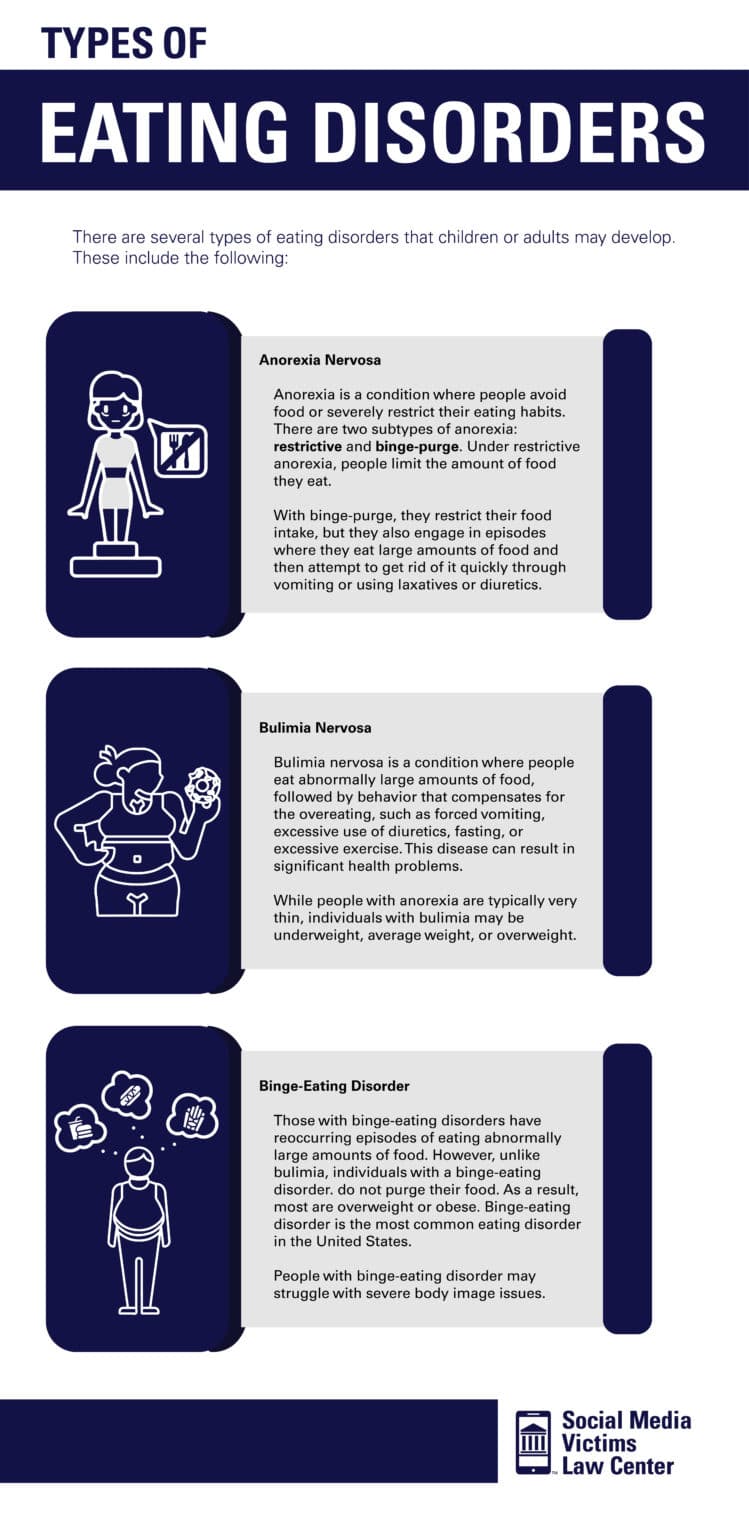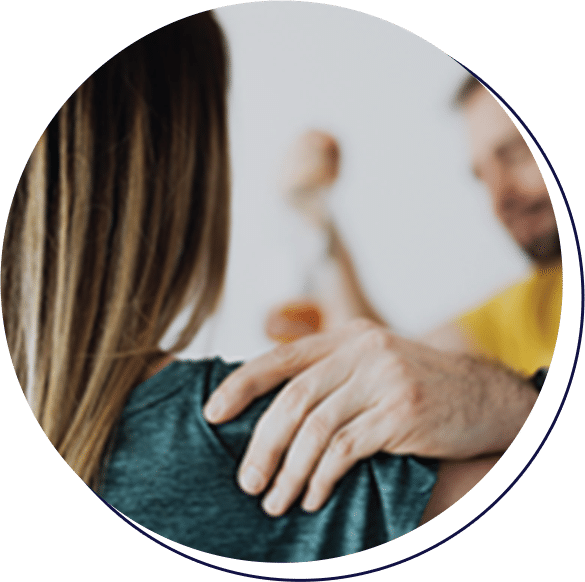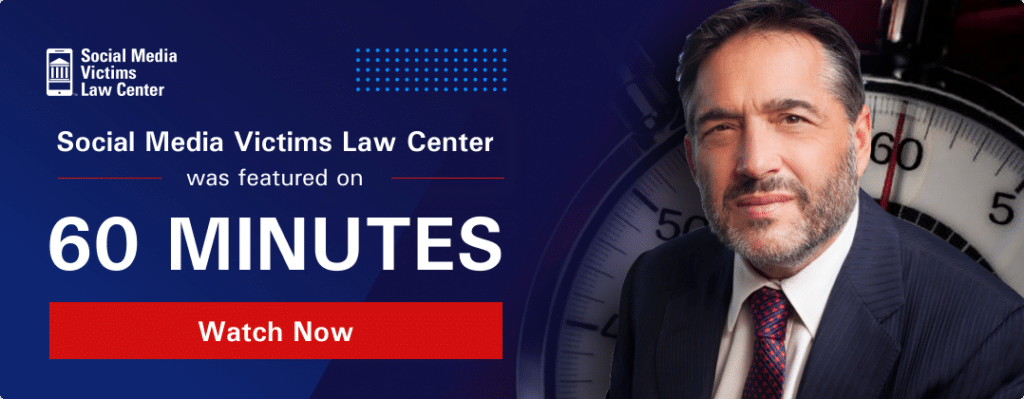Social Media Effects on Eating Disorders
Social media is highly important in the lives of most young people. Studies show that, on average, teens spend over seven hours per day viewing videos or using social media platforms. Tweens are no exception and spend over four hours per day on their smartphones. The average age of smartphone ownership has also dropped. In 2019, over two-thirds of children owned a smartphone by the age of 12, up from only 41% in 2015.
 Written and edited by our team of expert legal content writers and reviewed and approved by Attorney Matthew Bergman
Written and edited by our team of expert legal content writers and reviewed and approved by Attorney Matthew Bergman
- Content last updated on:
- February 26, 2024
Written and edited by our team of expert legal content writers and reviewed and approved by

- Content last updated on:
- February 26, 2024
What You’ll Learn
- Types of Eating Disorders
- Link Between Eating Disorders and Social Media Use
- Social Media and Unrealistic Expectations of Body Image
- Cyberbullying and Eating Disorders
- What is the responsibility of social media sites to discourage eating disorders?
- Impact of COVID-19 on Social Media and Eating Disorders
- Social Media Effects on Teen Boys Suffering from Eating Disorders
- How can parents help protect their teens from the dangers of social media use and potential eating disorders?
These days, social media is incredibly important in the lives of most young people. Studies show that, on average, teens spend over seven hours per day viewing videos or using social media platforms. Tweens are no exception and spend over four hours per day on their smartphones. It’s no wonder, then, that in 2019 over two-thirds of children owned a smartphone by the age of 12, up from only 41% in 2015, just four years earlier!
As might be expected, heightened social media usage has led to notable psychological changes in children and teens.
Social media networking sites offer users the opportunity to post pictures of themselves, their friends and family, and what they’re doing. However, the constant availability of these pictures often leaves viewers feeling negatively about themselves.
The consistent use of ads, videos, and pictures by celebrities and social media influencers appears to have caused an increase in teens’ concerns about body image. Videos and pictures from celebrities and “influencers” are often “photoshopped” or modified to reflect an ideal image that just isn’t real. For women, the ideal may be very thin, with perfect skin and teeth and good taste in clothing. For men, the image is generally muscular and tall.
Spending increased time viewing these videos and social media posts, children and teens have become accustomed to seeing ideal body images but may not realize how much they have be altered.
That has led many to attempt adjusting their own bodies to match the unrealistic images through the use of dieting and excessive exercise. Unfortunately, the result of these efforts may balloon into eating disorders or mental health issues such as low self-esteem, low self-confidence, depression, or anxiety.
Research has found a link between social media use and eating disorders. According to a study conducted in Australia and New Zealand, 51.7% of girls aged 13 and 14 with a social media account were likely to report severe changes to their eating routines, like skipping meals or over-exercising. Forty-five percent of boys the same age reported the same problems.
Another study reviewed the association between Instagram use, which is dominated by “perfect body” pictures and posts, and the presence of anorexia nervosa. Among 680 users who followed health-food accounts, 49% were found to exhibit symptoms of anorexia.
Young people may also experience a phenomenon known as cyberbullying. This bullying can occur when other teens of the same age make comments or send messages that are derogatory in nature. They might also make comments that are sexual in nature. This abuse can lead to severe mental health issues, including social anxiety, body image concerns, and depression.
Cyberbullying may also lead to eating disorders, particularly if the person is subjected to comments about their size, shape, or weight.
There are steps parents can take to protect their children from excessive social media use and potential eating disorders. Talk to your teens and children about the importance of maintaining positive relationships with friends, family, and teachers. Encouraging a balance of healthy eating and exercise through group sports and outdoor play can be extremely helpful. When they do engage in social media, talk to them about how pictures and videos may be “photoshopped” or edited and how most people don’t have a perfect appearance. The more they know about how images are presented, the more likely they are not to fall prey to the influence of unrealistic expectations.
Additionally, if you monitor their accounts, you can avoid instances of extreme cyberbullying. Recognizing and combating online bullying early can help prevent persistent harm to your child.
The fact is social media frequently uses algorithms to promote content designed to be attractive to users who fit a certain demographic or lifestyle. That means that individuals who are clearly health-oriented may be bombarded with social media feeds that advertise exercise, weight loss, and extreme dieting. Social media sites have the opportunity to alter their algorithms, so these types of posts aren’t directed towards certain individuals, but they have chosen not to do this.
Social media networking sites could also adopt policies that prevent younger users from even establishing an account. Studies show that children younger than 13 have no real reason to join Facebook or Instagram. They can talk with friends in person or through text messages. If parents adopt policies that limit their children’s access, the children are less likely to develop anxiety or mental health problems associated with too much media exposure.
Whether or not social media is the culprit, if you suspect your child or teen is suffering from an eating disorder, seek immediate professional help. Don’t attempt to fix the problem on your own. Also, remain calm and focused on listening to and reassuring your child. Help them find ways to practice self-love and boost their self-confidence.
However, if you believe your child’s eating disorder might be the result of social media use and influence, please contact the Social Media Victims Law Center today to discuss your legal rights and available remedies. The Social Media Victims Law Center works to hold social media companies legally accountable for the harm they inflict on vulnerable users. Reach out to us today and schedule a free consultation.
These days, social media is incredibly important in the lives of most young people. Studies show that, on average, teens spend over seven hours per day viewing videos or using social media platforms. Tweens are no exception and spend over four hours per day on their smartphones. It’s no wonder, then, that in 2019 over two-thirds of children owned a smartphone by the age of 12, up from only 41% in 2015, just four years earlier!
As might be expected, heightened social media usage has led to notable psychological changes in children and teens.
Social media networking sites offer users the opportunity to post pictures of themselves, their friends and family, and what they’re doing. However, the constant availability of these pictures often leaves viewers feeling negatively about themselves.
The consistent use of ads, videos, and pictures by celebrities and social media influencers appears to have caused an increase in teens’ concerns about body image. Videos and pictures from celebrities and “influencers” are often “photoshopped” or modified to reflect an ideal image that just isn’t real. For women, the ideal may be very thin, with perfect skin and teeth and good taste in clothing. For men, the image is generally muscular and tall.
Spending increased time viewing these videos and social media posts, children and teens have become accustomed to seeing ideal body images but may not realize how much they have be altered.
That has led many to attempt adjusting their own bodies to match the unrealistic images through the use of dieting and excessive exercise. Unfortunately, the result of these efforts may balloon into eating disorders or mental health issues such as low self-esteem, low self-confidence, depression, or anxiety.
Research has found a link between social media use and eating disorders. According to a study conducted in Australia and New Zealand, 51.7% of girls aged 13 and 14 with a social media account were likely to report severe changes to their eating routines, like skipping meals or over-exercising. Forty-five percent of boys the same age reported the same problems.
Another study reviewed the association between Instagram use, which is dominated by “perfect body” pictures and posts, and the presence of anorexia nervosa. Among 680 users who followed health-food accounts, 49% were found to exhibit symptoms of anorexia.
Young people may also experience a phenomenon known as cyberbullying. This bullying can occur when other teens of the same age make comments or send messages that are derogatory in nature. They might also make comments that are sexual in nature. This abuse can lead to severe mental health issues, including social anxiety, body image concerns, and depression.
Cyberbullying may also lead to eating disorders, particularly if the person is subjected to comments about their size, shape, or weight.
There are steps parents can take to protect their children from excessive social media use and potential eating disorders. Talk to your teens and children about the importance of maintaining positive relationships with friends, family, and teachers. Encouraging a balance of healthy eating and exercise through group sports and outdoor play can be extremely helpful. When they do engage in social media, talk to them about how pictures and videos may be “photoshopped” or edited and how most people don’t have a perfect appearance. The more they know about how images are presented, the more likely they are not to fall prey to the influence of unrealistic expectations.
Additionally, if you monitor their accounts, you can avoid instances of extreme cyberbullying. Recognizing and combating online bullying early can help prevent persistent harm to your child.
The fact is social media frequently uses algorithms to promote content designed to be attractive to users who fit a certain demographic or lifestyle. That means that individuals who are clearly health-oriented may be bombarded with social media feeds that advertise exercise, weight loss, and extreme dieting. Social media sites have the opportunity to alter their algorithms, so these types of posts aren’t directed towards certain individuals, but they have chosen not to do this.
Social media networking sites could also adopt policies that prevent younger users from even establishing an account. Studies show that children younger than 13 have no real reason to join Facebook or Instagram. They can talk with friends in person or through text messages. If parents adopt policies that limit their children’s access, the children are less likely to develop anxiety or mental health problems associated with too much media exposure.
Whether or not social media is the culprit, if you suspect your child or teen is suffering from an eating disorder, seek immediate professional help. Don’t attempt to fix the problem on your own. Also, remain calm and focused on listening to and reassuring your child. Help them find ways to practice self-love and boost their self-confidence.
However, if you believe your child’s eating disorder might be the result of social media use and influence, please contact the Social Media Victims Law Center today to discuss your legal rights and available remedies. The Social Media Victims Law Center works to hold social media companies legally accountable for the harm they inflict on vulnerable users. Reach out to us today and schedule a free consultation.
The significant shift in heightened social media usage and ownership of smartphones has led to psychological changes in children and teens.
The consistent use of ads, videos, and pictures by celebrities and social media influencers appears to have caused an increase in body image problems. Celebrities’ and influencers’ videos and pictures are often airbrushed and modified to reflect an ideal image. For women, the ideal may be very thin, with perfect skin and teeth and good taste in clothing. For men, the image is generally muscular and tall.
With the increased time spent viewing various videos and social media posts, children and teens have become accustomed to seeing ideal images of male and female bodies and may not realize how much these pictures might be altered.
Thus, some may attempt to adjust their own bodies to match the images through the use of dieting and excessive exercise. However, these efforts may balloon into eating disorders or manifest into other mental health issues such as low self-esteem, low self-confidence, depression, or anxiety.
Types of Eating Disorders
There are several types of eating disorders that children or adults may develop. These include the following:
Anorexia Nervosa
Anorexia is a condition where people avoid food or severely restrict their eating habits. They may weigh themselves often and be consistently unhappy with their body image, no matter how thin they become.
There are two subtypes of anorexia: restrictive and binge-purge. Under restrictive anorexia, people limit the amount of food they eat. With binge-purge, they restrict their food intake, but they also engage in episodes where they eat large amounts of food and then attempt to get rid of it quickly through vomiting or using laxatives or diuretics.
Warning Signs
There are several symptoms that may occur with anorexia nervosa. These include:
- Extremely restricting eating
- Emaciation
- Relentless pursuit of thinness
- Intense fear of gaining weight
- Distorted body image
As the disease progresses, it may lead to additional problems, such as dry skin, constipation, low blood pressure, brain damage, and multiorgan failure.
Bulimia Nervosa
Bulimia nervosa is a condition where people eat abnormally large amounts of food, followed by behavior that compensates for the overeating, such as forced vomiting, excessive use of diuretics, fasting, or excessive exercise. This disease can result in significant health problems.
Warning Signs
The indications that bulimia nervosa may be present include:
- Worn tooth enamel and increasingly sensitive and decaying teeth
- Acid reflux disorder
- Chronically inflamed and sore throat
- Intestinal distress and irritation from laxative abuse
- Electrolyte imbalance
While people with anorexia are typically very thin, individuals with bulimia may be underweight, average weight, or overweight.
Binge-Eating Disorder
Those with binge-eating disorders have reoccurring episodes of eating abnormally large amounts of food. However, unlike bulimia, individuals with a binge-eating disorder do not purge their food. As a result, most are overweight or obese. Binge-eating disorder is the most common eating disorder in the United States.
Warning Signs
People with a binge-eating disorder may exhibit the following symptoms:
- Eating unusually large amounts of food within a short period of time
- Eating even when full or not hungry
- Feeling ashamed, distressed, or guilty about eating
People with binge-eating disorder may struggle with severe body image issues.

Link Between Eating Disorders and Social Media Use
Much research has found a link between social media use and eating disorders. According to a study conducted in Australia and New Zealand, 51.7% of girls aged 13 and 14 with a social media account were likely to report disordered eating routines, such as skipping meals or strict exercising. Forty-five percent of boys of the same age were likely to report the same problems.
Another study reviewed the association between Instagram use and the presence of anorexia nervosa. Among 680 users who followed health-food accounts, 49% of them were found to exhibit symptoms of anorexia nervosa.
The prevalence increased amongst those who were heavy users of Instagram. Interestingly, a similar study of Twitter users did not present a similar finding. The picture-dominated platform of Instagram may be more likely to lead to body image issues or low self-esteem.
Social Media and Unrealistic Expectations of Body Image
Social media networking sites offer users the opportunity to post pictures of themselves, their friends and family, and what they’re doing. However, the constant availability of these pictures often leaves viewers feeling more negatively about themselves. After seeing photos of others, they may feel envious or discontent with their own lives or appearances and develop low self-esteem.
There’s also constant pressure to present a perfect image through profile pictures and social media posts. When social media users compare their own photos with those of others, they may feel a sense of shame if their photo doesn’t align with the image they wish to present to their friends. This shame leads to a decline in self-image, increased social anxiety, and potential mental health problems.
Cyberbullying and Eating Disorders
Young people may also experience a phenomenon known as cyberbullying. This bullying can occur when other teens of the same age make comments or send messages that are derogatory in nature.
An example is when a teen posts a picture of themselves and other people criticize their size or clothing. They might also make comments that are sexual in nature. This abuse can lead to severe mental health issues, including social anxiety, body image concerns, and depression.
Cyberbullying may also lead to eating disorders, particularly if the person is subjected to comments about their size, shape, or weight. To reduce bullying, teens may reduce the amount of food they intake or adopt excessive exercise routines. If the bullying is severe enough, it may result in isolation, substance abuse problems, or suicidal ideation.
What is the responsibility of social media sites to discourage eating disorders?
Social media frequently uses algorithms to promote content designed to be attractive to users who fit a certain demographic or lifestyle. Thus, individuals who are clearly health-oriented may be bombarded with social media feeds that advertise exercise, weight loss, and extreme dieting. Social media sites have the opportunity to alter their algorithms so that these types of posts are not directed towards certain individuals.
All social media networking sites can also adopt policies that prevent younger users from establishing an account. Studies show that children younger than 13 have no real reason to join Facebook or Instagram. They can communicate with friends in person or through text messages. By adopting policies that limit access, children are less likely to develop anxiety or mental health problems associated with too much media exposure.
Impact of COVID-19 on Social Media and Eating Disorders
The lockdowns imposed during the initial phases of the COVID-19 pandemic led to extremely high levels of social media usage. Since people were limited from seeing friends and family at work or school, many used social media networking sites as an outlet for communication. However, the prevalence of social media may have also led to an increase in eating disorders.
The stress of the pandemic led many people to isolate themselves from others. With isolation came the need to find things to fill their time. Social media was one of those things. Another was exercise. With gyms closed, many began exercising through the use of home machines or outdoors. Some began exercising excessively, leading to a growing prevalence of distorted body image.
Social Media Effects on Teen Boys Suffering from Eating Disorders
Girls are not the only ones who can develop eating disorders. Boys may do so, too, although cases are not as rampant. Commonly, eating disorders in boys are exhibited through excessive exercise. They may adopt weight lifting in an effort to increase their muscle size or start running to increase their speed. Boys may post on social media about their new gym habits and follow influencers who post about their exercise or bulk eating routines.
The connection to social media can make the pressure to meet certain weight goals or physical characteristics much more intense. For those who already enjoy sports, the constant pressure to perform may lead them to adopt extreme routines they find through social media. This approach can lead to potential eating disorders.

How can parents help protect their teens from the dangers of social media use and potential eating disorders?
The first step to protecting children from excessive social media use and potential eating disorders lies in limiting their social media time from a young age. Children are not entitled to smartphones or social media sites. Not having such access can alienate them from their peers, especially as they become teenagers, but allowing them other outlets to spend time with their friends can mitigate those issues.
Encouraging a balance of healthy eating and exercise through group sports and outdoor play can also be very helpful. Be sure not to talk negatively about their eating habits; they need positive reinforcement and need to know that you support them. Talk to them about the importance of maintaining positive relationships with friends, family, and teachers. Body positivity is also an important factor; kids need to understand that weight or muscles do not automatically determine whether or not someone is healthy and that their weight does not determine their worth.
When they do begin to engage in the use of social media, talk to them about how pictures may be edited or airbrushed and how most people don’t have a perfect appearance. The more they know about how images are presented, the more likely they are not to fall prey to the influence of unrealistic expectations.
Additionally, if you consistently monitor their accounts, you can avoid instances of extreme cyberbullying. Recognizing and combating online bullying early can help prevent persistent harm to your child.
If you suspect your child or teen is suffering from an eating disorder, seek immediate professional help. Do not attempt to fix the problem on your own. Also, remain calm and focused on listening to and reassuring your child. Help them find ways to practice self-love and boost their self-confidence.
Lastly, if you believe your child’s eating disorder might be the result of social media use and influence, contact the Social Media Victims Law Center today to discuss your legal rights and any available remedies.
Frequently Asked Questions
For individuals and children who have been
We only handle cases on a contingent fee basis. This means that we are paid a portion of any recovery obtained in the case and you do not owe us any attorneys’ fees if the lawsuit does not result in a recovery.
Every case is unique. Our attorneys will work with your family to evaluate your potential case and help you evaluate whether filing a lawsuit or other legal proceeding is in your family’s best interest. Generally speaking, the types of cases we handle involve serious mental health effects, including attempted or completed suicide, eating disorders, inpatient mental health treatment, or sexual trafficking/exploitation that was caused by or contributed to through addictive or problematic social media use by teens and young adults.
We are a law firm based near Seattle, WA comprised of lawyers who have spent their entire careers representing victims who have been harmed by dangerous products. We are also parents. Shocked and troubled by the recent revelations about the harm caused to teens and young adults by social media platforms, which powerful technology companies have designed to be highly addictive, Social Media Victims Law Center was launched specifically to help families and children who have suffered serious mental harm or exploitation through social media use to obtain justice.
Contact Us Today
Related Pages
Client Testimonials
Explore Popular Topics

Addiction

Suicide

Eating Disorders

Anxiety

Bullying

Sexual Abuse

Body Image





